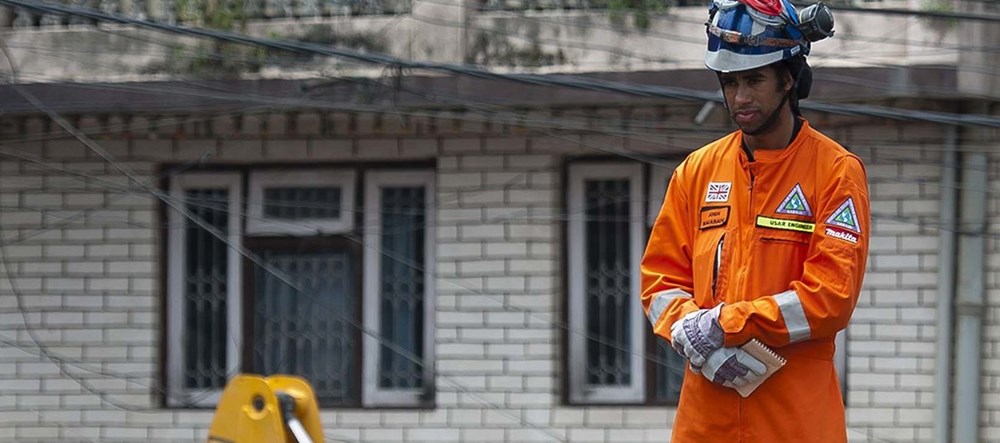Engineers save lives: earthquakes and tsunamis
We spoke to Joshua Macabuag, earthquake and tsunami researcher, and search and rescue volunteer engineer.

A tsunami is one of nature's most powerful and devastating events. They cause havoc in coastal locations. They can kill thousands of people and destroy the homes they live in.
Tsunamis damage and destroy all the things that make up cities, communities and lives, including hospitals, roads, water and electricity supplies.
Engineers like Joshua Macabuag bring hope. Engineering knowledge and research helps reduce the impact of disasters in the future. Engineers work in search and rescue, constructing shelters and providing emergency supplies to the injured and homeless. Engineers get electricity and communication systems up-and-running again. Engineers save lives.
Read on to find out how engineers like Joshua help protect communities around the world...
Photo credits: Joshua Macabuag (CEng MICE), Search & Rescue Engineer, SARAID
Name: Joshua Macabuag
Age: 31
Job title: Research Engineer
Degree: University of Oxford: Engineering Science (MEng), First Class
Other qualifications: CEng MICE MEng
Employer: EPICentre, UCL
Where you live: London
Tell us about your job. What do you do?
I am a researcher at the Earthquake and People Interaction Centre (EPICentre), University College London, applying my passion and knowledge of engineering to investigate methods to calculate and limit damage to urban environments due to tsunamis.
What does an average day look like for you?
It’s fairly varied. If I’m at my desk then an “average day” might consist of modelling on a computer how the structure of a building is affected by a tsunami, or I might be analysing damage on the many tens of thousands of buildings affected by the T-hoku tsunami in Japan in 2011. However, I’m equally likely to be attending a conference or workshop in the UK or overseas, conducting field studies, or delivering presentations to colleagues or students.
How does your work affect people’s lives and the world around us?
Over 18,000 people died in the 2011 Japan tsunami. More than 240,000 people died in the tsunami in the Indian Ocean in 2004. With an increasing, urbanising global population, and with many growing urban areas in coastal zones, many more people are at risk of tsunamis and other coastal disasters around the world.
The research that we do at EPICentre goes towards enabling engineers to design better sea defences and tsunami-resistant buildings and other structures, as well as providing the tools needed for town planners and people working in disaster management.
What made you want to be an engineer?
I first became interested in engineering as a profession through my love of maths and science at school. I became hooked when I learned of the roles that engineers can have in humanitarian and relief work, which demonstrated the real impact that engineers can have on people’s lives.
There are a number of different routes you can take into a career in engineering. What route did you take and why?
I spent a pre-university gap year working in the research and development department of Arup, the engineering company in London. I then studied Engineering Science (MEng) at Oxford University, working throughout the summer breaks to build my experience. After graduation I spent a year volunteering in a town in rural South Africa before moving back to work in London again.
How important was studying maths and science in school for what you do now?
Very. I have applied almost everything that I learnt in my A-levels, either directly, or the knowledge has enabled me to learn other aspects of applied engineering.
What do you like most about engineering?
I enjoy working on real projects around the world which have a direct impact on people’s lives and society as a whole. But the most enjoyable aspect of the job is the constant interaction with people, from colleagues and design teams to the people that we work with from other organisations.
What do you like to do in your spare time?
I volunteer as a search and rescue engineer with the non-governmental organisation SARAID (Search and Rescue Assistance in Disasters) so the training for that keeps me busy most weekends. Otherwise I might be practicing the martial art jiu-jitsu to stay fit, or relaxing with friends and family.
What personal qualities are important for being an engineer?
Engineers are required to operate in so many arenas. You are required to be a technical expert; managing teams and resources to meet deadlines and challenging objectives, whilst also operating in a very commercial and legal environment.
So to me, the most important quality to stay on top of all of your responsibilities is a strong enjoyment of learning, being part of a team and enjoying a challenge!
What advice would you give a young person who was considering engineering as a future career?
Understand that engineering will require you to actively continue learning throughout your entire career. Learn to enjoy learning and you’ll love your job!
See Joshua's profile at This Is Engineering